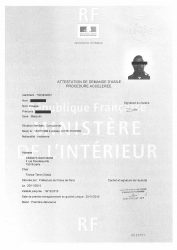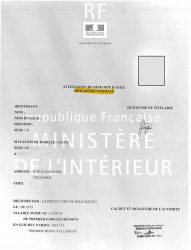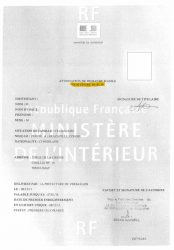
At the end of your appointment at the one-stop service, the prefecture official gave you a certificate of asylum seeker (ADDA) called “Procédure accélérée” (fast-track procedure), and the asylum application file which is called OFPRA file.
The prefecture can indeed decide to process your file using the fast-track procedure in one of the following cases:
-In case you refused to have your fingerprints taken by the prefecture, or in case your fingerprints can not be read.
-In case you already applied for asylum and you are applying for a reconsideration of your file.
-In case you are have hidden information about you or your journey.
-In case you got an Obligation to leave the French territory (OQTF)
-In case you filed your application more than 90 days (or 60 days if you are in Guyane) after your arrival to France, and you could not explain the delay.
-In case you are a national of one of the following countries : Albania, Armenia, Bosnia Herzegovina, Cape Verde, Georgia, India, Kosovo, Macedonia, Mauritius, Moldavia, Mongolia, Montenegro, Serbia, or one of the European Union countries.
The fast-track procedure is a summary procedure, that offers fewer guarantees that the case will be examined thoroughly than the normal procedure.
>> The certificate is valid for 6 months, but you have to send the file completed to the French Office for the Protection of Asylum Seekers and Stateless Persons (OFPRA) before 21 days.
Pay attention to the following points when filling the OFPRA file in :
1/ The file must be filled in in French. If you need it, you can ask a dedicated association to help you.
2/ The file must be signed.
3/ You must enclose the following documents with the file:
– 2 photos
– A copy of your certificate of asylum seeker
– In case you have it: your ID card or passport (original)
4/ You must send the file using a registered letter with acknowledgment of receipt (“lettre recommandée avec accusé de réception”), or you can bring it directly to the OFPRA.
>> If your file is complete: You will receive on your space a letter confirming that your asylum application has been registered with OFPRA, and in most cases you will also receive an invitation to the interview.
>> If your file is incomplete:You will receive a request on your secure Personal Digital Space asking you to complete the missing information. You have 8 days to do so.
>> Attention: If you exceed this deadline, your asylum application may be closed. You will then have 9 months to request the reopening of your asylum application.
>> You will benefit from the social rights granted to the asylum seekers (such as access to the medical care system), as well as from the financial aid on condition that you accepted the OFII offer.
I think that my demand should be considered in Normal Procedure. How can I request the change of procedure ?
You should inform the OFPRA (in your story or at the interview) why you think that you shouldn’t have been placed on Fast-track procedure (procédure accélérée). The OFPRA has the ability to examine your file in normal procedure (procédure normale). If the OFPRA does not do so, you may present you arguments to the CNDA.



